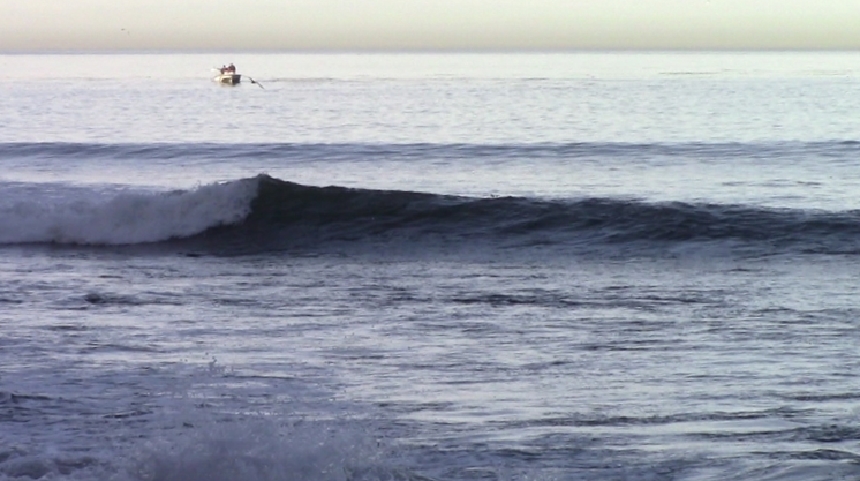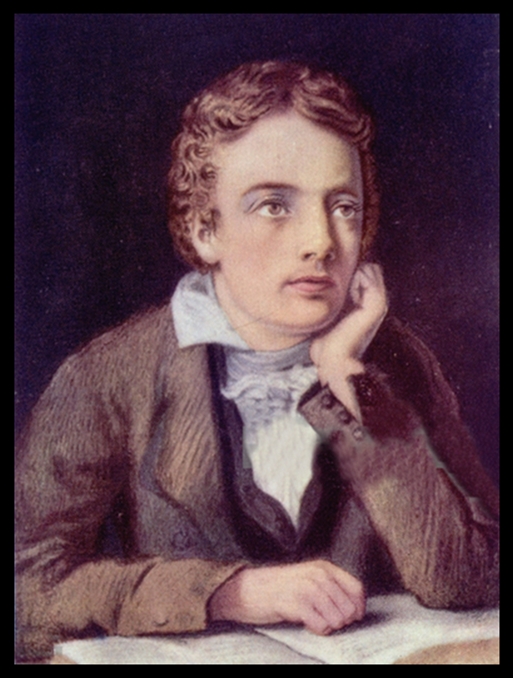 POETRY PAGE Featuring a Few Lines From John Keats' "Endymion" ************** On His Zillion Dollar Boat or Something... (...you miserable worm.) Hello, and welcome to the chucktrevino.com Poetry Page. This time around we're featuring a short segment of a very long poem by John Keats called Endymion; I've included the first 62 lines or so from Book 1 on this page... if you do like it, and feel intrigued enough to want to read more, perhaps even all four books (get a comfortable chair), I'll be providing a link to them shortly. If you're not a big fan of poetry, the outmoded English may confuse you... always remember: you must proceed slowly!  It seems to me that John Keats had a very sad life indeed, marked by early ridicule and the deaths of loved ones. He
was born in London, England on October 31, 1795, but lost his father, a livery-stable keeper, at the young age of
eight. That was followed by the death of his mother, a victim of tuberculosis, only six years later in 1809; ten
years later he lost his brother Tom, also to tuberculosis. More tubercular unhappiness was to follow shortly.
It seems to me that John Keats had a very sad life indeed, marked by early ridicule and the deaths of loved ones. He
was born in London, England on October 31, 1795, but lost his father, a livery-stable keeper, at the young age of
eight. That was followed by the death of his mother, a victim of tuberculosis, only six years later in 1809; ten
years later he lost his brother Tom, also to tuberculosis. More tubercular unhappiness was to follow shortly.
John inherited a fairly substantial amount of money after his father's death which should have enabled him to pursue his poetic ambitions, but was later ripped off by a man his mother had trusted to take care of them. John rallied back and became an apothecary-surgeon's assistant, then a licensed apothecary (a fairly lucrative trade similar to a modern day pharmacist), but rejected the secure position in favor of trying to become a published poet. He became acquainted with the editor of an influential paper called The Examiner, Leigh Hunt; Hunt published a couple of Keats' sonnets, “On First Looking into Chapman’s Homer” and “O Solitude,” and introduced him to famous English poets Percy Bysshe Shelley and William Wordsworth. Their influence helped Keats to get his first volume, Poems by John Keats, published in 1817. This was followed a year later by Endymion, a four-thousand-line "erotic/allegorical romance" based on a Greek myth. Unfortunately for John, the two most influential critical magazines of the time, the Quarterly Review and Blackwood’s Magazine, didn't appreciate his efforts; they attacked his works viciously, dubbing Hunt’s Romantic literary circle “the Cockney school of poetry" and declaring Endymion to be nonsense; they recommended that Keats give up writing poetry altogether. Shelley wrote a more praising review, but it was never published. Shelley later mocked Keats after his sad death, calling him "the poet slain by a bad review," or something insensitive like that. After getting slammed by the august learned morons, and hoping for inspiration, Keats embarked on a summer walking tour in Northern England and Scotland, but had to return back home to take care of his brother Tom who had succumbed to tuberculosis. It was at that time that Keats met and fell in love with Fanny Brawne, a neighbor, but sadly could not afford to marry her as he had not made it as a successful published poet and had no other source of income, having abandoned his apothecary job. Keats was determined to make it in his chosen would-be profession though, and carried on, writing some of his finest poetry between 1818 and 1819. He began writing another lengthy poem, “Hyperion," which was a blank-verse epic of a Greek creation myth, but stopped for a while subsequent to Tom's death in 1819 after finishing only a small portion; however in late 1819 he rewrote the piece as “The Fall of Hyperion” which went unpublished until 1856. In autumn of 1819 Keats contracted tuberculosis himself, and by the following February had fallen so ill that he began to long for death, cursing his “posthumous existence.” In July 1820 Keats' third and best volume of poetry, Lamia, Isabella, The Eve of St. Agnes, and Other Poems was published, works dealing with legendary mythical themes of ancient, medieval, and Renaissance times; definitely not for fast-food readers. That volume also contained the unfinished “Hyperion," as well as three other poems which are now considered among the finest in the English language, namely “Ode on a Grecian Urn," “Ode to a Nightingale,” and “Ode on Melancholy." This book was enthusiastically reviewed by Hunt, as well as the more well-established poets Shelley and Charles Lamb among others; in August 1820 the editor of the respected Edinburgh Review, Frances Jeffrey, praised both the new book and also the previously slagged "Endymion." Although the fragment “Hyperion” was considered by Keats’ peers to be his finest achievement, by that time Keats had reached the advanced stages of tuberculosis and could not appreciate his triumph. He still wrote letters to his love Fanny Brawne for a while, until he could no longer continue doing that due to severe depression, corresponding with Fanny's mother instead; his doctor advised him to move to a warmer climate and John departed to Rome with a friend, a painter named Joseph Severn, who was with him when he died there on February 23, 1821, at the age of twenty-five. Keats was buried in Rome's Protestant cemetery; Fanny Brawne mourned his death for eight years before marrying. Yes, John Keats' life seemed extremely sad to me, indeed; if it doesn't break your heart to read about Keats sitting in the back of his schoolroom crying uncontrollably after the death of his mother, as his classmates looked on in amazement, maybe you'd better check with your doctor to see if you actually have a heart; you may be surprised at what the doc tells you. But in contrast to the "prettiness" of the picture of him just below, and the feminine delicacy of some of his verses, Keats was actually well-known as a feared fighter; his two-fisted abilities came in handy when dealing with any insensitive cad who had the bad luck to mock his uncontrollable public displays of grief, and no doubt served him well during other episodes throughout the short duration of his life, such as the time Keats came across a sadistic philistine torturing a cat (the poet's eternal friend) in a London back alley. Keats thrashed him.  |

by John Keats (From Book 1 of Endymion) |
A thing of beauty is a joy for ever:
Its loveliness increases; it will never
Pass into nothingness; but still will keep
A bower quiet for us, and a sleep
Full of sweet dreams, and health, and quiet breathing.
Therefore, on every morrow, are we wreathing
A flowery band to bind us to the earth,
Spite of despondence, of the inhuman dearth
Of noble natures, of the gloomy days,
Of all the unhealthy and o’er-darkened ways
Made for our searching: yes, in spite of all,
Some shape of beauty moves away the pall
From our dark spirits. Such the sun, the moon,
Trees old and young, sprouting a shady boon
For simple sheep; and such are daffodils
With the green world they live in; and clear rills
That for themselves a cooling covert make
’Gainst the hot season; the mid forest brake,
Rich with a sprinkling of fair musk-rose blooms:
And such too is the grandeur of the dooms
We have imagined for the mighty dead;
All lovely tales that we have heard or read:
An endless fountain of immortal drink,
Pouring unto us from the heaven’s brink.
Nor do we merely feel these essences
For one short hour; no, even as the trees
That whisper round a temple become soon
Dear as the temple’s self, so does the moon,
The passion poesy, glories infinite
Haunt us till they become a cheering light
Unto our souls, and bound to us so fast,
That, whether there be shine, or gloom o’ercast,
They alway must be with us, or we die.

Therefore, ’tis with full happiness that I
Will trace the story of Endymion.
The very music of the name has gone
Into my being, and each pleasant scene
Is growing fresh before me as the green
Of our own vallies: so I will begin
Now while I cannot hear the city’s din;
Now while the early budders are just new,
And run in mazes of the youngest hue
About old forests; while the willow trails
Its delicate amber; and the dairy pails
Bring home increase of milk. And, as the year
Grows lush in juicy stalks, I’ll smoothly steer
My little boat, for many quiet hours,
With streams that deepen freshly into bowers.
Many and many a verse I hope to write,
Before the daisies, vermeil rimm’d and white,
Hide in deep herbage; and ere yet the bees
Hum about globes of clover and sweet peas,
I must be near the middle of my story.
O may no wintry season, bare and hoary,
See it half finished: but let Autumn bold,
With universal tinge of sober gold,
Be all about me when I make an end.
And now at once, adventuresome, I send
My herald thought into a wilderness:
There let its trumpet blow, and quickly dress
My uncertain path with green, that I may speed
Easily onward, thorough flowers and weed.
**********